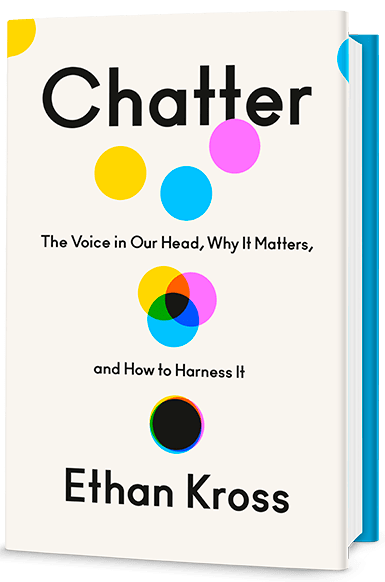Shape your environment, shape your mind
 One of the biggest contributors to our happiness is something we barely pay attention to: the voice inside our own heads.
One of the biggest contributors to our happiness is something we barely pay attention to: the voice inside our own heads.
As psychologist Ethan Kross describes in his new book Chatter, that voice is constantly analyzing the situations we’re in, reflecting on the past and future, and telling us who we are. While sometimes friendly and optimistic—it’s OK, everything’s going to work out!—it can also be critical and downbeat. Our inner voice can berate us for mistakes or decide our life is ruined. It can ruminate on negative emotions and experiences, dredging them up without any kind of constructive resolution.
According to Kross, there are three main ways we can turn down the chatter in our heads: shifting our perspective so we’re not so immersed in our problems, talking with others to get support, and changing the environment around us.
The first two approaches work in the moment of distress: Kross offers tips on how to step back and gain some distance, and then share our problems with others. But changing our environment is something we can do proactively, to make us less likely to ruminate in the first place.
“We’re embedded in our physical spaces, and different features of those spaces activate psychological forces inside us, which affect how we think and feel,” writes Kross. “If we make smart choices about how we relate to our surroundings, they can help us control our inner voice.”
Here are three suggestions from Kross’s book to optimize your environment for a calmer mind.
1. Surround yourself with nature
Plenty of research suggests that nature makes us feel good and improves our health, too, whether we’re taking a nature walk, living in areas with more green space, or just looking at trees.
Nature also seems to help buffer against the stress we experience in life. For example, one study in the U.K. found that being exposed to green spaces protected people from the harmful effects of poverty on their health. In another study, poor residents in urban public housing felt that the obstacles in their life were less severe and more solvable when their apartment looked out onto greenery, rather than a cityscape.
Why is nature so soothing? A 2015 study provides a clue. When participants spent 90 minutes walking through grasslands, they reported ruminating less than those who walked through busy city streets. Not only that, but their brain scans showed less activity in networks that support rumination. Being around nature may actually influence our habitual thought patterns.
Even if you don’t have many trees on your street, this research is still relevant. In fact, other studies suggest that you can get some of the attention-improving and stress-reducing benefits of nature just by looking at nature photos or listening to birds and rain—and plants help, too.
2. Create opportunities for awe
Being in nature, in the face of tall trees or breathtaking views, we often experience a sense of awe: the feeling of being in the presence of something vast that challenges our understanding of the world.
But nature isn’t the only thing that can evoke awe, Kross explains. We can also feel awe when we read poetry or listen to music, watch great athletic feats or our toddlers’ memorable firsts.
“Awe is considered a self-transcendent emotion in that it allows people to think and feel beyond their own needs and wants,” Kross writes. “The operative power of awe is its ability to make us feel smaller, nudging us to cede control of our inner voice to a greater grandeur.”
This is reflected in the brain: When we feel awe, we show less activity in brain areas involved with self-focus and mind-wandering. Awe almost automatically makes our problems feel smaller and gives us that broader perspective, without us having to engage directly with the problems at all. For example, one study that took volunteers on a river-rafting trip found that the more they experienced awe, the better the improvements in their stress, post-traumatic stress disorder, happiness, and sense of belonging.
So, what does an awe-inspiring environment look like? It’s probably different for everyone, but it might mean putting up art or photographs on your walls, playing music that transports you, or being sure to unplug from your technology to notice the beauty in the people around you.
3. Clear the clutter
When our thoughts and feelings seem out of control, one way we can get a grip is to exert a sense of control over our environment—by decluttering.
“Seeing order in the world is comforting because it makes life easier to navigate and more predictable,” Kross writes. Even just reading about how the world is an orderly place can make us less anxious, one study suggests.
There’s also evidence that when we feel out of control—when we think about a situation where we were helpless, or when we’re exposed to loud noises we can’t turn down—we’re more drawn to visual patterns and structured images, as we try to impose order on our external world.
Decluttering might also just make us happy. According to a new study, people who have a more positive experience of the clutter in their home—who are less ashamed, upset, or inconvenienced by their clutter—tend to experience more positive emotions, better relationships, and more meaning in life.
Like the other two strategies, decluttering can be done proactively, but it may also soothe you in a moment of stress—as anyone who’s ever done any “procrasti-cleaning” knows.
Of course, even with the most verdant, awe-inspiring, Marie Kondo’d home, we won’t be able to avoid rumination entirely, and that’s where Kross’s other strategies come in. His book ends with a helpful list of 26 tools to pull out when you start to feel overwhelmed by repetitive negative thinking. And his own personal experiences, shared throughout the book, remind us that even a researcher with expertise on the topic isn’t immune to freaking out every now and then.
 While the voice in our heads may seem like our enemy sometimes, there are lots of ways we can turn that conversation in a productive direction.
While the voice in our heads may seem like our enemy sometimes, there are lots of ways we can turn that conversation in a productive direction.
Kira M. Newman is the managing editor of Greater Good. Based at UC-Berkeley, Greater Good highlights ground breaking scientific research into the roots of compassion and altruism. Copyright Greater Good.
To learn more:
- New book shares science and techniques to breathe better and promote calmness not anxiety
- Exploring the human brain and how it responds to stress (1/3)
- On World Health Day 2020, let’s discuss the stress response and the General Adaptation Syndrome (2/3)
- The frontal lobes, the little brain down under and “Stayin’ Alive” (3/3)


